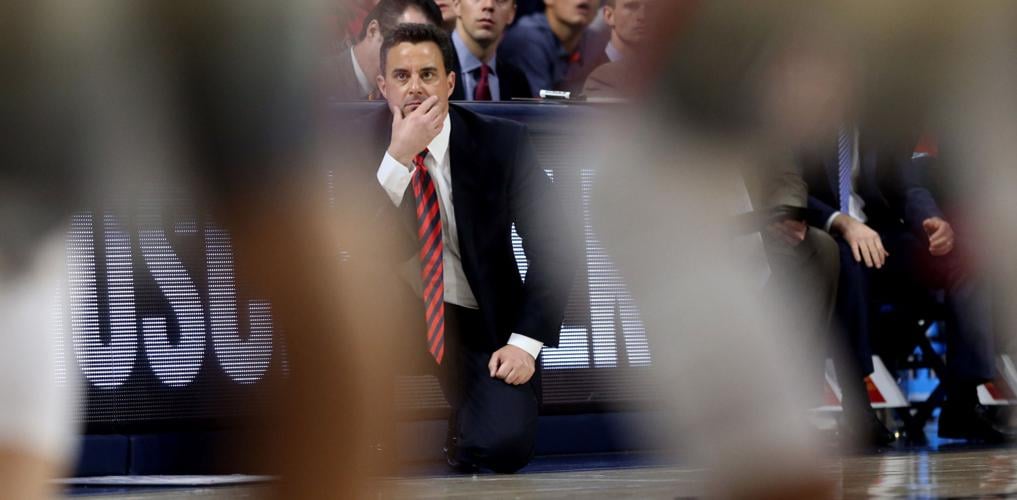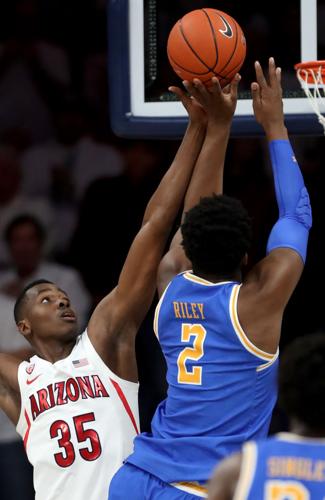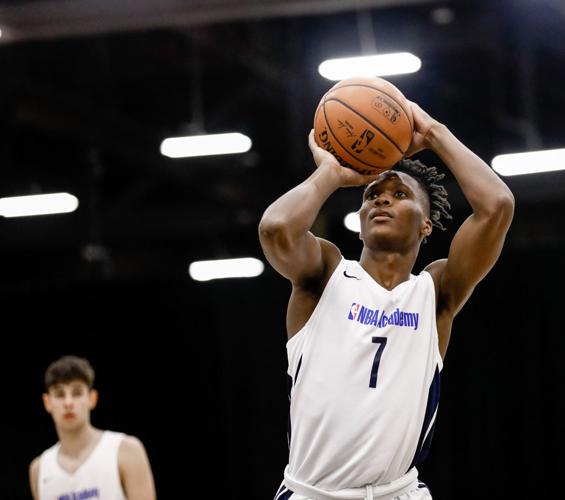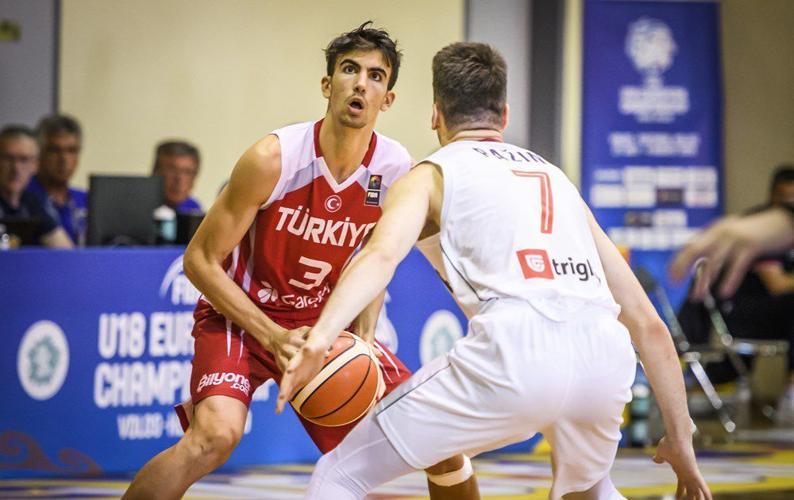If ever the cross-cultural experiment that is Arizona basketball in 2020-21 becomes too frustrating, with 10 newcomers from all over the globe trying to help replace a decimated playing rotation, Bennedict Mathurin, Christian Koloko and Daniel Batcho can always unload without fear.
Because nobody else on the team understands French curse words.
“Sometimes when I’m messing up a play, I might talk with Christian in French, so the coaches won’t know what I’m saying,” Mathurin said, chuckling. “Sometimes it just comes out of my mouth, saying it in French.”

Bennedict Mathurin played for the NBA Academy program.
Koloko, the sophomore center from French-speaking Cameroon who was joined this season by the Quebec-bred Mathurin and Paris forward Batcho, can also flip back and forth as it best suits him, too.
“Sometimes English just comes out of my mouth and then I realize it’s Benn or Daniel,” Koloko said. “I’ll be like, ‘Oh, it’s Daniel. I’m just going to talk in French because it easier, and the other guy is not going to understand what I’m saying.’ ”
And when those guys are talking on one end of the court, freshman twins Azuolas and Tautvilas Tubelis can whisper to each other in their native Lithuanian, a language Estonian guard Kerr Kriisa also heard plenty of while playing for Lithuanian club Zalgiris last season. Then there’s wing Tibet Gorener, a native of Turkey who picked up a SoCal tongue while finishing high school in Orange County.
All together, this season’s Wildcats have guys from seven countries, speaking five native tongues, all trying to form one bond.
They have seven freshmen, three transfers and three returnees, all trying to form a competitive Pac-12 team.
And one head coach who is trying to bring them all together, despite having studied a second language that actually doesn’t really help.
“I took Spanish, but if you’d asked me to speak Spanish right now, I might be stuck on a word,” Miller said. “We here in America, we’re conditioned to speak one language and almost don’t feel the need to learn a second one. I almost wish that I had.”
That’s OK. Because Miller also speaks international basketball, having coached USA Basketball teams in FIBA events, and all his players speak English well, anyway.
The real translation work is coming within the English language and on the floor, in the rules differences between the FIBA and U.S. college games, and in the jump many of the new Wildcats are making to high-major NCAA ball.
“In the beginning, it was different,” senior forward Ira Lee said. “It wasn’t that the new guys didn’t speak English, it was just that they were in a new place, and in a whole different system of basketball. So there’s gonna be a lot of different terms that come up, like ‘jumping the ball screen’ or ‘X out on help defense’
“That type of stuff is not going to click with them, but now they’re more comfortable.”
In other words, in any language, the biggest issue the Wildcats might be facing this season is just to keep figuring it all out.

Arizona center Christian Koloko (35) stretches out to knock away a shot UCLA forward Cody Riley (2) in the first half of their Pac-12 game at McKale Center, February 8, 2020 Tucson, Ariz.
“When you have great talent, that certainly allows you to be the most successful you can be,” Miller said.
“But the other word that’s really important is experience. Sometimes it’s a freshman starter returning for his second year, or it’s a role player that has been a part of your program for multiple seasons, and now he becomes a starter as an upperclassman.
“That’s what we don’t have this year. We don’t have great experience. Matter of fact, it might be the least experienced team that I’ve ever coached.”
That remark occurred during Miller’s annual preseason media day interview in October, while Miller has continued to downplay expectations this month. When the Pac-12 announced Nov. 12 that UA was picked fifth in its preseason poll, Miller said that was “much higher than I would have anticipated.”
Then, on Friday, Miller dampened things down again, noting that Lee was out with a concussion while also fretting over what might happen if COVID-19 testing and/or contact tracing tore his roster apart.
“I just worry the most about our inexperience. I worry about our lack of overall depth, especially in light of COVID because everybody has to be ready to go,” Miller said. “You could face a game against a very good opponent with seven scholarship players and in our case, a lot of guys that are in their first year.”
But some perspective here might be needed. For one, as college football teams are finding this fall, any team can be subject to random roster issues or cancellations while trying to navigate carefully through the pandemic.
For another, the reason the Wildcats had to replace so many guys was, in part, because three of their starters last season were freshmen who just turned into NBA draft picks.
That’s a good problem to have.
It’s just that top-tier replacements were not easy to find.
Still with an NCAA infractions case hanging over their recruiting efforts, the Wildcats reportedly chased after 10 of the top 50 players in the 247Sports.com composite 2020 rankings — and landed one of them, Phoenix wing Dalen Terry.
Then they turned to the transfer market, adding prolific Seattle U scorer Terrell Brown as a grad transfer to two transfers who sat out last season, guard James Akinjo from Georgetown and forward Jordan Brown from Nevada.
Finally, needing more, UA dug deeper into international recruiting pipelines established by associate head coach Jack Murphy. They turned to Canada to land Mathurin in January, and in the spring went virtually to Europe to get commitments from Kriisa, Batcho and the Tubelis brothers while also pulling in Istanbul’s Gorener via California.
It was an accelerated version of Miller’s plan to add more international recruits after finding success with one-and-dones Lauri Markkanen (Finland) and Deandre Ayton (Bahamas) plus ever-improving production from affable Serbian big man Dusan Ristic.
“It took a few years for us to kind of build,” Miller said. “You look at those three guys, and they all had great moments at Arizona, so that certainly helped us, but Jack Murphy has a real passion to recruit internationally. He has relationships. He brought that ingredient to us.”
As evidenced in their 2020-21 roster, the Wildcats now have a three-part recruiting strategy that includes chasing traditional U.S. high school targets, transfers who can add instant experience, and international players.
This season, the most productive Wildcats might just be the transfers.
In Akinjo, the Wildcats have an aggressive, experienced point guard who was the Big East’s Freshman of the Year in 2018-19, an award that Miller won 31 years earlier at Pitt.
“They don’t give that award to just anyone,” Miller said, grinning.
Akinjo averaged 13.4 points over 40 total games with Georgetown and that number could rise with the Wildcats. He’ll also be counted on for playmaking and with helping the new guys adjust.
“I think everything is kind of more physical, especially when (playing) against James,” Kriisa said. “James is on my ass every day in the practices. I haven’t really felt that before.”
And that’s from a guy who isn’t exactly soft. Kriisa played briefly for Zalgiris’ senior team last season and was the Estonian national team hero in a win over Lithuania last summer, almost angrily telling a reporter afterward to “stop talking” when he mentioned that the game was only an exhibition matchup.
Wearing the same No. 25 as his namesake, former UA great Steve Kerr, Kriisa is expected to play both guard spots, possibly backing up Akinjo and also playing with him as a shooting guard. That’s the same combo-guard role Jemarl Baker played last season, while Miller says Baker is now playing more off the ball.
Baker had 73 assists to just 23 turnovers last season — better than a 3-to-1 ratio — but he also showed some much-needed shooting when he hit 4 of 7 3s and scored 17 points in UA’s 75-72 win at Washington.
“He certainly can play the one, but based on how our team’s made up, I think he’ll be in the game most of the time, if not all the time, with (another) point guard,” Miller said. “I think that frees him up to get away from running our team, and being more of a playmaker and a shooter.”
Then there’s Terrell Brown, who led the WAC in scoring last season with an average of 20.7 points a game and also has the ability to handle the ball. Brown is almost certain to start or play a significant role on the perimeter, with his 22 years of age and compelling experience in college basketball also likely to be assets.
Lightly recruited out of Seattle’s Garfield High School, Brown went to a local junior college to gain exposure and experience, then walked on at Seattle U as a sophomore — and became an all-league player there last season.
“I do see myself as a leader,” Brown said. “At first it was kind of hard being on a new team and being a leader but as you continue to play, you’re more vocal because of the experiences you’ve been through. People kind of lean on you a lot.”
Miller essentially went with three guards last season, with Nico Mannion, Josh Green, Dylan Smith, Max Hazzard and Baker rotating into the three spots, and he could do the same this time with Akinjo, Brown, Kriisa and Baker. He also has three options for a bigger third perimeter player, in Terry, Mathurin and Gorener.
Whereas Gorener is a shooter, both Terry and Mathurin are tall, athletic wings who can get to the basket — if they can adjust to the new obstacles that will be in their way this season.
“It’s a lot harder to get layups in college,” Terry said. “You have to really go in there with a force to score.”
Mathurin said he played point guard with NBA Academy teams last season, but at UA he’s a bigger guard who may at least initially carve out a niche on the defensive side with his length and athleticism.
“I’ve got to adjust; I’ve got to guard from one to three,” Mathurin said. “I feel like my game is improving. I’m loving it.”
While Tautvilas Tubelis is expected to have only a limited role initially on the wing, Azuolas Tubelis has already shown he has the size and skills to make a big impact inside.
“That’s my silent killer,” Lee said. “He doesn’t say much. But he comes in every day, he does his job. He works hard, and he might be one of the best left-handed players I’ve ever played with.”
While Lee is doubtful for at least the Wildcats’ opening games, he will eventually team with Azuolas Tubelis at power forward, while Jordan Brown can play either post spot, and Koloko will start or play a key reserve role at center. Batcho is expected to be sidelined until at least late January after suffering a knee cartilage issue in October.
Brown’s cred suggests he could lead the frontcourt this season: He was a McDonald’s high school all-American in 2018 before playing a limited role on a veteran Nevada team in 2018-19 and was one of the Wildcats’ best practice players while sitting out last season.
Miller said over the summer that Brown would be a double-figure scorer and this fall, he has awarded Brown two of the UA’s weekly gold jerseys for overall practice production.
“Jordan not only knows our system better than a lot of players on this year’s team, but that year of development served him well,” Miller said. “I think he’s going to be a very productive player, not only in our program this year, but he’s going to go on and have a great career.”
By the Wildcats’ current standards, Brown’s year as a Nevada reserve and his year as a UA redshirt qualify him as a veteran.
And with three seasons as a key UA reserve, Lee is pretty much the wise old sage, another factor in helping the new guys along.
“I actually wondered before coming back how it was gonna work this season, because this is a team with a bunch of new guys — and not just the European guys,” Lee said. “But when we got together, I saw that they all work hard. They all listen, and they all want to win.
“So I’ve just always been in their ears — ‘Do this, lift a little more here, maybe you should eat this, and on the court always play hard. Even if you make a mistake.’ Because the big thing with being a freshman is you make mistakes, then you think, ‘Oh I’m the worst player in the world.’ It’s not like that. You’re gonna make 100 mistakes. Keep going.”
Keep going. Grow fast. Learn. (And test negative, of course.)
If the 2020-21 Wildcats are going to be competitive in the Pac-12 race, and make a case for the NCAA Tournament, they have no other options.







